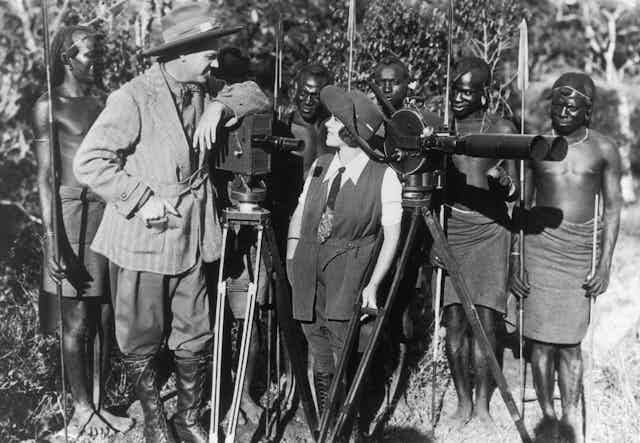Western media is attempting to correct its racist and stereotypical coverage of Africa. Is it time for African media to do the same?

J. Sigurow Wahuto, New York University, David Cheruiyot, University of Groningen
Quick question: What do these headlines have in common? “A Dark Continent Seeking Light,” “Yes, Ebola Is Bad. But There Are Worse Things in Africa,” or “Witchcraft and Cannibalism in the African Jungle.” Yes, they’re all about Africa. But the more accurate answer is that they were all headlines featured in the prestigious New York Times.
These are just a few examples of how traditional Western media has historically covered Africa. Today, news reports that reinforce negative perceptions and support racial profiling and misrepresentation are declining, but the damage to the continent and its communities remains.
American media scholar Meredith Clark predicted that 2021 would be “the year journalism starts paying reparations.” She coined the term “reparative journalism” to describe a new approach in which American media “atones for itself … through radically inclusive editorial choices.”
In response to this call, many news organizations have published prominent apologies, acknowledging their racist framing of the news or their ties to slavery. Other forms of reparation have been recognized. For instance, The 1619 Project by The New York Times provided a platform for marginalized communities to reexamine the history of slavery and racism. In the UK, The Guardian launched a similar project, “Cotton Capital,” as part of a broader program for restorative justice.
Scholars have argued that this embraces a strategy of “re-narrating journalistic news.” While there have been some positive developments in how Africa is covered internationally, continuous cultural change is needed, particularly in how news is produced. This requires rethinking journalist training and adopting a more community-oriented approach to reporting.
In this reflection, should African media also consider its harmful historical role in supporting colonial interests and the perspectives of the Global North?
As media researchers focusing on how journalism operates on the continent, we’ve studied how African journalists cover African news in relation to global media. In an upcoming academic book, Wahuto examines the factors that shaped African journalism and why African narratives have been marginalized by African journalists themselves.
It’s important for countries with minority-majority populations to confront their dark history of colonialism, slavery, genocide, or racial discrimination. But there’s also the question of how—or even if—this is something African media and professionals need to address.
Facing Africa?
Journalism has a long history in Africa. The first newspaper appeared in the late 18th century in Egypt, followed by South Africa in 1800 and Sierra Leone in 1801. Indigenous newspapers such as the “Lagos Weekly Record” (Nigeria), “L’Action Tunisienne” (Tunisia), “Imvo Zabantsundu” (South Africa), and “Ng’ata ya Kirinyaga” (Kenya) didn’t shy away from exposing the harms of colonial governments or African elites. But this changed after independence due to political repression by new African governments and the continued influence of Western approaches in journalism education and training, which became the standard.
Research has shown that when covering international events occurring on the continent, African newspapers tended to source their stories from Western organizations rather than from other African countries. This is often presented as a necessary function of resource scarcity. For example, it might be cheaper for Kenya to obtain news stories from a global news agency rather than Ugandan newspapers (some of which are owned by competing Kenyan media companies).
As one journalist once said:
“We have this mentality that foreign media is better… until they mock us.”
If New York Times reporters acknowledge that their organization distorts Africa’s image, why do New York Times stories appear in Kenyan newspapers? Especially when reporting on events in Kenya? Whatever the reasons—of which there are many—it’s time for African media to also reflect on reparative journalism. To consider whether African journalism has contributed to these distortions through outsourcing or what’s understood as “good journalism.”
Many media institutions in Africa have yet to examine how they’ve absorbed white normative approaches to journalism.
National Geographic apologized for its portrayal of Indigenous Australians as “savages.” Perhaps some Kenyan newspapers should be asked about their apologies for expanding the colonial military’s presence and thereby the violence against Kenyans.
The Future
A new era of cultural reflection in the United States and the United Kingdom has paved the way for a global conversation on reparative journalism. Among the proposals is for news organizations to find new ways of reporting. These methods include more sustainable coverage of misrepresented communities, fairer dealings with minority communities in the future, and expanding.



